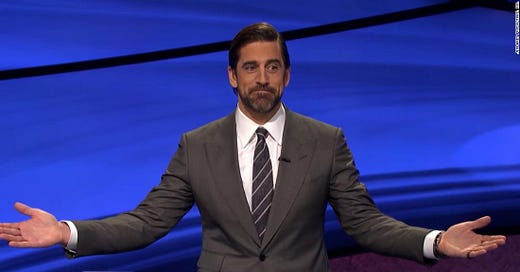A Failure of Central Planning in Green Bay
Seems like the big story from the NFL Draft last week was not anything about the draft itself, but the news that Aaron Rodgers may want out of Green Bay. On the one hand, this has been brewing for a while, at least since the team took a quarterback in the first round last year. Rodgers was open about not liking that, and about other decisions the franchise has made since. But if it’s true, it is really quite the fuck up by the Packers.
Rodgers is a legend in Green Bay—a former Super Bowl champion who has led the team to five conference title games. More importantly, he’s the reigning NFL MVP and one of the two or three best quarterbacks in football right now. At a time when having an elite quarterback is the most important thing in the game, there is basically no way for the Packers to trade Rodgers and get better, in either the short term or the long term. So perhaps Rodgers is bluffing, or his dissatisfaction is fixable, but if not then the franchise is really screwed.
What we have here is a real failure of central planning. The Green Bay front office has not been especially bad during the Rodgers era. After all, the Packers made the playoffs every year he was healthy from 2009 on. But it’s clear that the people in charge were not on the same page as the players, or even the coaching staff, on the field. Despite Rodgers’ emergence as a star player, they did not consistently surround him with the kind of offensive talent that Tom Brady had in New England, or Drew Brees had with the Saints. Other than two offensive tackles, they did not draft an offensive player in the first round from 2005 to 2020.
But it wasn’t like they were building an elite defense over that time. They kept an offensive-minded head coach, who Rodgers evidently did not like or respect, for 13 years, while the defense was generally mediocre (the one year it wasn’t, in 2010 when it was #2 in the league, they won the Super Bowl). In other words, there was a real disconnect between the on-field product and what the front office was planning. Even now, the reports are that the coaching staff and the front office are divided over how to handle the Rodgers situation.
This kind of disconnect is what people worry about when they hear the phrase “central planning.” The phrase conjures up images of Soviet leaders in ominous rooms designing inflexible Five-Year Plans that are then brutally imposed. Like a coach forcing his team to use the West Coast offense. And yet centralized planning is part of any economy. You have to make decisions and investments for the future, and not just on the level of a football team or individual firm. The distinction between macroeconomic policy decisions and “planning” is a slippery one. Was the persistent decision to respond to dips in the stock market from 1987 to 2008 by lowering interest rates a “plan”? It certainly seemed like one—and one that caused a huge credit bubble.
But the problem with “central planning” is not the “planning” part—it’s the “central” part. The issue with the Fed is not that it makes policy decisions; it’s that those decisions are not democratically accountable, and often unduly influenced by a class of wealthy asset-holders. Similarly, the problem in Green Bay is not that the team drafted poorly, or hired a bad coach—it’s that it made these decisions seemingly without consulting its star and most important player. Only by forcing their hand by possibly demanding a trade has Rodgers been able to have any kind of say.
I don’t think stars should have total power over personnel moves (LeBron James has a pretty mixed track record as a GM, for example), but it seems reasonable to give them a seat at the table. If not for fairness reasons, just to prevent the kind of missteps an unchecked GM can make, as what seems to be happening in Green Bay.



